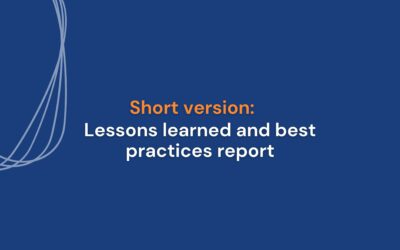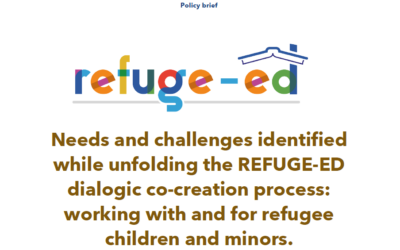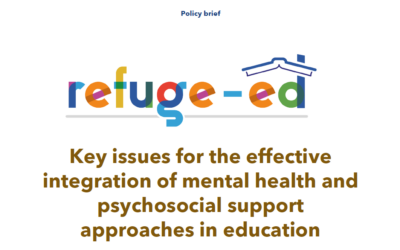Interim report
During Work Package 3 ‘Implementing pilot actions in three distinctive settings’, partners implemented the trainings and piloting of the co-created practices in schools, Hotspots/Reception and Identification Centres and institution care facilities. The trainings...
Training curriculum for pilots
During the initial phase of the REFUGE-ED project [Effective Practices in Education, Mental Health and Psychosocial Support for the integration of Refugee Children], the project partners identified good practices and approaches in Mental Health and Psychosocial...
Guidelines for pilot actions’ implementation
The REFUGE-ED dialogic co-creation process (hereinafter, RDCP) is the methodological framework that will guide the implementation of the pilot actions during the project. This document introduces the theoretical premises on which the RCDP is based and sketches the...
Selected actions to address the integration challenges of migrant children
This document provides an individualized overview of each of the 46 pilots that are being implemented as part of the REFUGE-ED project in six different countries: Bulgaria, Ireland, Greece, Italy, Spain and Sweden. 3 of the pilots are being implemented in...
Key Issues for the effective integration of the MHPSS approach into education
This report outlines key issues for the effective integration of the MHPSS approach into education. It draws from the results of the WP1 literature and policy review and mapping of different best-practice, tools and solutions in the fields of MHPSS and education (in...
Effective and socially innovative initiatives for the integration of migrant children in Europe
The main objective of this report is to present the effective practices and approaches from the fields of education (including formal, non-formal and informal education), and mental health and psychosocial support (MHPSS) that are efficiently contributing to the...
Short version: Lessons learned and best practices report
Promoting educational success, promote wellbeing and a sense of belonging for children with a refugee or migrant background has been the ultimate goal of the REFUGE-ED project. To this end, the project has identified, implemented, and evaluated evidence-based...
Lessons learned and best practices report
Building on the social impact of previous EU research in the field of education and mental health and psychosocial support (MHPSS), REFUGE-ED identified, implemented and evaluated evidence-based practices in education and MHPSS that have been shown to promote...
Policy brief: Needs and challenges identified in the dialogic co-creation process: working with and for refugee children and minors.
REFUGE-ED aims to identify, implement, and evaluate evidence-based practices that can be implemented across diverse educational settings to promote the educational success as well as mental health and psychosocial functioning (sometimes collectively termed, mental...
Policy brief: Key issues for the effective integration of mental health and psychosocial support approaches in education
Children and youth with refugee or asylum seeker background, face many hazards and complex situations. Data from UNHCR indicates that globally 77% of refugee children attend primary school, only 31% of refugee youth access secondary education, and a mere 3% access...









